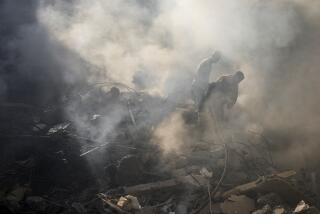U.S. Calls for Beirut Truce, Cites ‘Escalation’ by Syria
- Share via
WASHINGTON — The Bush Administration, accusing Syria and its Lebanese allies of “an irresponsible escalation” of violence, called for an immediate cease-fire Monday in the bloody artillery war in Beirut.
“We note that Syrian-supported forces have joined the latest ground fighting in Lebanon,” State Department spokesman Richard Boucher said. “Syria and its allies should refrain from any further escalation and accept immediately international and Arab League calls for a cease-fire and for the lifting of the blockades.”
Although Boucher also called for restraint by Lebanese army forces loyal to Maj. Gen. Michel Aoun, leader of the country’s Christian minority, he made it clear that Washington considers Syria primarily responsible for four days and nights of nearly nonstop shelling.
Bombardment Resumes
In Beirut, the guns fell silent briefly Sunday night, but the shelling resumed Monday. The respite gave dazed residents a chance to crawl out of their shelters to stock up on food and other provisions before Christian and Syrian gunners opened fire again in the afternoon.
Reports reaching Damascus, the Syrian capital, said that Muslim batteries pounded their usual targets in Christian East Beirut and Lebanese army positions around the mountaintop town of Souq el Gharb.
On Sunday, the Lebanese army repulsed a ground assault, reportedly led by Syrian troops, on the Souq el Gharb fortifications. It was the first infantry attack in five months of fighting in and around Beirut.
Level of Combat Rises
The Souq el Gharb assault escalated the level of combat between the two sides. According to word from Beirut on Sunday, the Muslim forces were led by a Syrian brigade. But in Damascus early Monday, a government spokesman denied that Syrian ground troops were involved.
Syria first sent peacekeeping troops into Lebanon in 1976 to help end the first outbreak of Muslim-Christian fighting. Today, it has about 40,000 troops there, controlling about two-thirds of the country, and is no longer regarded as a peacekeeper.
An informed analyst in Damascus said that the Muslim forces attacked two Christian positions but were forced to retreat under heavy artillery fire from a third, which is on higher ground. There were no immediate reports of renewed assaults Monday.
Casualty Figures
The British news agency Reuters, quoting “independent sources” in Beirut, said that 28 Syrians, 17 Druze and 25 Palestinians had been killed in Sunday’s fighting at the strategic ridgeline town overlooking the Christian sector of Beirut and Aoun’s bunker at the presidential palace in suburban Baabda.
A spokesman for the Progressive Socialist Party of Druze leader Walid Jumblatt said that 35 Christians were killed in the assault. He made no mention of Muslim casualties. The Druze, an offshoot sect of Islam, are allied with the Syrians and their Lebanese Muslim allies in the current fighting.
In Washington, Boucher coupled his condemnation of Syria with a call for Aoun and his allies to “observe a cease-fire and join in efforts to begin the process of political reconstruction and reconciliation.”
U.S. Now Naming Names
The United States, in its calls for a cease-fire, has only recently begun singling out the Lebanon combatants for criticism by name. In the past, the State Department has generally asked for restraint from all sides.
Boucher said that the United States continues to support peace-making efforts by Arab League nations even though a committee of top officials from Saudi Arabia, Morocco and Algeria recently abandoned reconciliation efforts after concluding that the situation was all but hopeless. He said that the United Nations also may be able to play a constructive role.
“We continue to believe that the Arab League is in the best position to bring about some solution to the problems in Lebanon,” Boucher said. “We understand that there is consideration being given to a U.N. Security Council meeting. The United States supports efforts to bring the issue of fighting in Lebanon to the Security Council, and we’re consulting closely with other members of the Security Council and with the secretary general in this regard.”
Kempster reported from Washington and Williams from Damascus, Syria.
More to Read
Sign up for Essential California
The most important California stories and recommendations in your inbox every morning.
You may occasionally receive promotional content from the Los Angeles Times.













